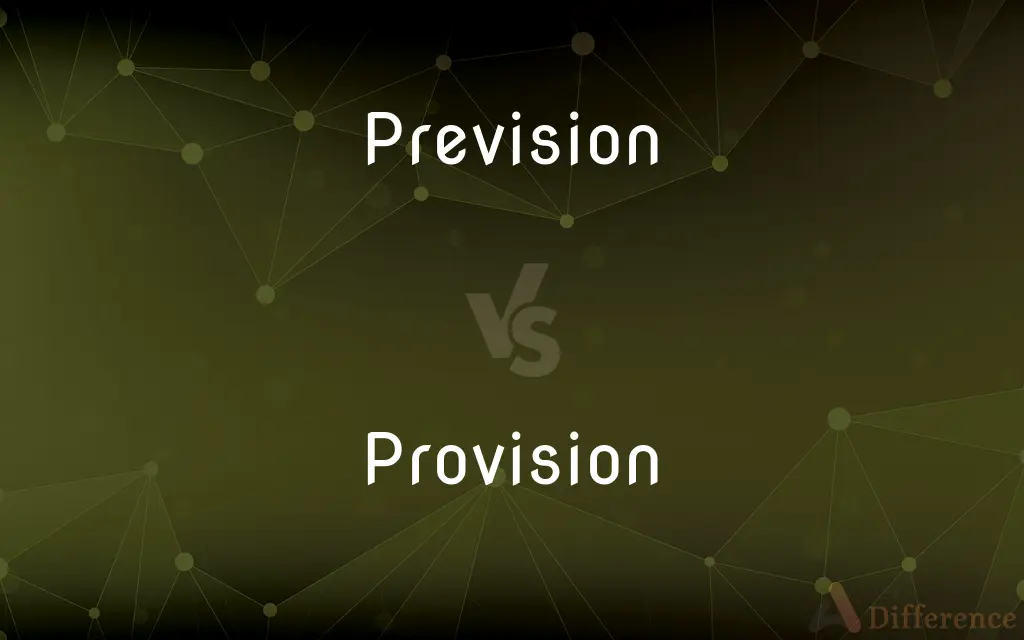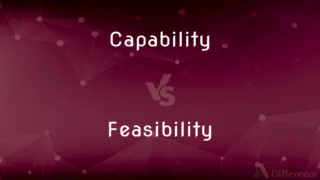Prevision vs. Provision — What's the Difference?
By Tayyaba Rehman & Fiza Rafique — Updated on March 27, 2024
Prevision is the act of foreseeing or predicting future events, while provision refers to the act of supplying or making something available in preparation for future use.

Difference Between Prevision and Provision
Table of Contents
ADVERTISEMENT
Key Differences
Prevision involves looking ahead and anticipating future events, challenges, or needs, based on analysis, intuition, or information. On the other hand, provision is about preparing for the future by making arrangements or supplying necessary items, ensuring readiness and adequacy.
While prevision is inherently speculative and focuses on the prediction aspect, provision is practical, concentrating on the concrete steps taken to prepare for foreseen or unforeseen future scenarios. Prevision is about foresight, whereas provision is about action.
Prevision often serves as a basis for making provisions. For instance, the prevision of a natural disaster leads to the provision of emergency supplies and services. Conversely, provisions are sometimes made based on general expectations without specific prevision, as in routine stockpiling for businesses.
The effectiveness of provision greatly depends on the accuracy and depth of prevision. Accurate prevision enables targeted and efficient provisioning, ensuring that resources are allocated optimally. Meanwhile, without prevision, provisions may be misplaced, insufficient, or excessive.
Prevision and provision work hand in hand within planning and preparation processes. Prevision identifies what might happen in the future, while provision involves taking steps to address those future possibilities. Both are essential for effective management and preparedness in various contexts, from personal to global scales.
ADVERTISEMENT
Comparison Chart
Definition
The act of foreseeing or predicting future events.
The act of supplying or making arrangements for future use.
Focus
Predictive, speculative.
Practical, preparatory.
Nature
Cognitive, based on analysis or intuition.
Action-oriented, involves tangible steps.
Basis for
Forms the basis for making provisions.
Based on prevision or general expectations.
Outcome
Insight into future possibilities.
Readiness and adequacy for future needs.
Compare with Definitions
Prevision
The act of foreseeing future events.
His prevision of market trends allowed the company to invest wisely.
Provision
Preparing or arranging in advance.
Provision of adequate resources ensured the project's success.
Prevision
Predicting what will happen or be needed in the future.
Her prevision of technological advances shaped the R&D department's focus.
Provision
The act of supplying or making available what is needed.
The provision of emergency services during the disaster was crucial.
Prevision
Anticipating future needs or challenges.
The city's prevision of increased traffic led to the construction of new roads.
Provision
The supply of food, drink, or equipment, especially for a journey.
The expedition team made provisions for a month-long journey.
Prevision
An estimate or prediction made about the future.
The prevision of population growth informed the new housing policy.
Provision
Making preparations for a future need or event.
The new law includes provisions for increasing educational funding.
Prevision
The foresight to plan for future events.
Effective prevision can mitigate the impacts of economic downturns.
Provision
Supply with provisions
Prevision
A knowing in advance; foresight.
Provision
The act of providing for a particular purpose or use.
The provision of high-speed internet in rural areas improved community access to resources.
Prevision
A prediction; a forecast.
Provision
The act of providing or supplying something
The provision of health care.
The provision of rations.
Prevision
To foresee.
Provision
The act of making preparations for a possible or future event or situation
The provision for retirement requires planning.
Prevision
Advance knowledge; foresight.
Provision
Something provided
A fire escape is an important provision in a building.
Prevision
A prediction.
Provision
Provisions Necessary supplies, such as food and clothing, as for a journey.
Prevision
To predict or envision the future.
Provision
A preparatory action or measure
We must make provisions for riding out the storm.
Prevision
Foresight; foreknowledge; prescience.
Provision
A particular requirement in a law, rule, agreement, or document
The constitutional provision concerned with due process.
Prevision
A prophetic vision (as in a dream)
Provision
To supply with provisions.
Prevision
The power to foresee the future
Provision
To take preparatory action or measures
A bank must provision against losses from bad loans.
Prevision
Seeing ahead; knowing in advance; foreseeing
Provision
An item of goods or supplies, especially food, obtained for future use.
Prevision
The act of predicting (as by reasoning about the future)
Provision
The act of providing, or making previous preparation.
Provision
Money set aside for a future event.
Provision
(accounting) A liability or contra account to recognise likely future adverse events associated with current transactions.
We increased our provision for bad debts on credit sales going into the recession.
Provision
(law) A clause in a legal instrument, a law, etc., providing for a particular matter; stipulation; proviso.
An arrest shall be made in accordance with the provisions of this Act.
Provision
(Roman Catholicism) Regular induction into a benefice, comprehending nomination, collation, and installation.
Provision
A nomination by the pope to a benefice before it became vacant, depriving the patron of his right of presentation.
Provision
(transitive) To supply with provisions.
To provision an army
Provision
To supply (a user) with an account, resources, etc. so that they can use a system.
Provision
The act of providing, or making previous preparation.
Provision
That which is provided or prepared; that which is brought together or arranged in advance; measures taken beforehand; preparation.
Making provision for the relief of strangers.
Provision
Especially, a stock of food; any kind of eatables collected or stored; - often in the plural.
And of provisions laid in large,For man and beast.
Provision
That which is stipulated in advance; a condition; a previous agreement; a proviso; as, the provisions of a contract; the statute has many provisions.
Provision
A canonical term for regular induction into a benefice, comprehending nomination, collation, and installation.
Provision
A nomination by the pope to a benefice before it became vacant, depriving the patron of his right of presentation.
Provision
To supply with food; to victual; as, to provision a garrison.
They were provisioned for a journey.
Provision
A stipulated condition;
He accepted subject to one provision
Provision
The activity of supplying or providing something
Provision
The cognitive process of thinking about what you will do in the event of something happening;
His planning for retirement was hindered by several uncertainties
Provision
A store or supply of something (especially of food or clothing or arms)
Common Curiosities
Can provision be made without prevision?
Yes, provisions can be made based on general expectations or standard practices without specific predictions.
How are prevision and provision related?
Prevision often informs the process of making provisions by predicting future needs, allowing for targeted and efficient preparation.
What are the types of provisions that can be made?
Provisions can include supplying goods, arranging services, allocating resources, or making legal arrangements, among others.
How can prevision be improved?
Prevision can be improved through analysis, experience, staying informed about trends, and using predictive models or technologies.
Is prevision only about negative outcomes?
No, prevision encompasses both positive and negative future outcomes, aiming to capitalize on opportunities as well as mitigate risks.
How does provision affect readiness?
Provision directly impacts readiness by ensuring that necessary resources and arrangements are in place to meet future needs or challenges.
What does provision mean?
Provision refers to the act of supplying or making arrangements in preparation for future use or needs.
Why is prevision important?
Prevision is important because it helps anticipate future events or needs, allowing for better preparedness and decision-making.
What is prevision?
Prevision is the act of foreseeing or predicting what might happen in the future.
Can prevision always predict accurately?
While prevision aims to be accurate, it is inherently speculative and subject to uncertainties, making absolute accuracy challenging.
What role does prevision play in business?
In business, prevision plays a crucial role in strategy, risk management, and planning, helping companies anticipate and adapt to market changes.
What factors influence the effectiveness of provision?
The effectiveness of provision is influenced by the accuracy of prevision, the timeliness of actions, and the adequacy of resources.
How can individuals use prevision in their personal lives?
Individuals can use prevision for personal financial planning, career development, and preparing for life changes, enhancing personal resilience and success.
Are there tools or methods to aid in prevision?
Yes, there are various tools and methods, including predictive analytics, trend analysis, and scenario planning, to aid in prevision.
What is the difference between provision in law and general provision?
In law, a provision refers to a specific clause or condition in a legal document, while in general terms, it refers to the act of preparing or supplying something for use.
Share Your Discovery

Previous Comparison
Capability vs. Feasibility
Next Comparison
Fashion vs. FadAuthor Spotlight
Written by
Tayyaba RehmanTayyaba Rehman is a distinguished writer, currently serving as a primary contributor to askdifference.com. As a researcher in semantics and etymology, Tayyaba's passion for the complexity of languages and their distinctions has found a perfect home on the platform. Tayyaba delves into the intricacies of language, distinguishing between commonly confused words and phrases, thereby providing clarity for readers worldwide.
Co-written by
Fiza RafiqueFiza Rafique is a skilled content writer at AskDifference.com, where she meticulously refines and enhances written pieces. Drawing from her vast editorial expertise, Fiza ensures clarity, accuracy, and precision in every article. Passionate about language, she continually seeks to elevate the quality of content for readers worldwide.














































